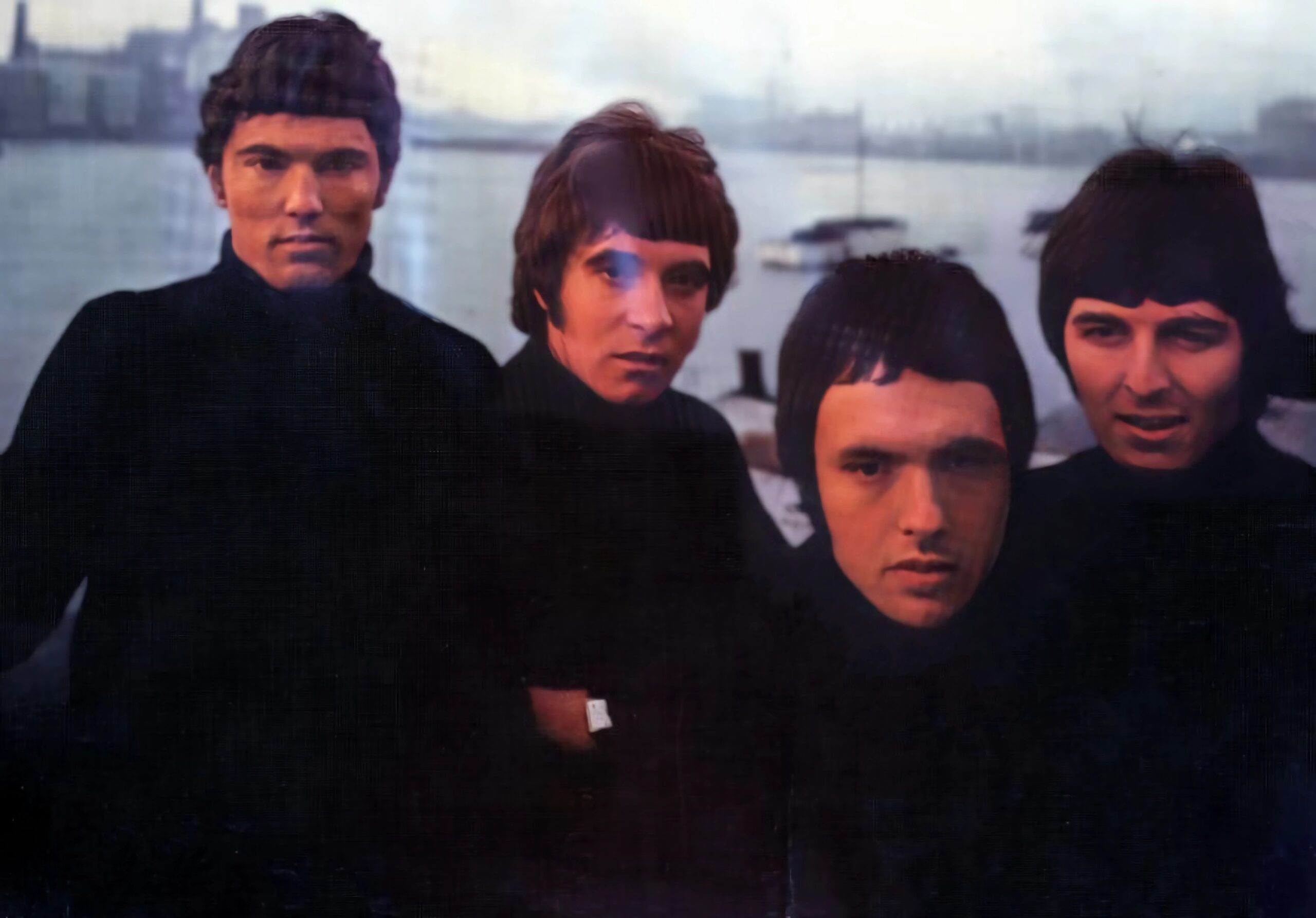
By Nick Warburton
Procession were one of the most musically ambitious groups to emerge on the Australian rock scene during the late 1960s and were the original architects of the classic single “Anthem (One Day in Every Week)”, later a UK top 20 hit for The New Seekers. An early vehicle for future Manfred Mann’s Earth Band guitarist/singer Mick Rogers, Procession recorded some exceptional material in Australia (and later the UK), but never achieved the commercial breakthrough that their initial creative surge promised.
It had all started so well. Barely two months after forming, Procession became a weekly feature on the nationally televised rock show Uptight, appearing in a special segment thanks to the show’s producer, David Joseph, who also happened to be the band’s manager. Procession enjoyed further exposure from writers Ian Meldrum and Lily Brett, who frequently praised them for their musical innovations in the popular Melbourne-based Go-Set teen magazine.
From the start, Procession set out to be different. According to writer Ian McFarlane in his excellent encyclopedia of Australian rock music, the band’s game plan was to make everything they did an Australian first. In this respect, Procession recorded their debut single, “Anthem”, a cappella; a 40-piece choir backed them for their debut television appearance; follow up single, “Listen”, was the first to be recorded on freshly installed eight-track equipment; and Procession Live at Sebastians was the first live LP in the country.
Yet, despite all of these innovations and the attention afforded the band, none of Procession’s Australian records were major chart successes and in July 1968 the group relocated to London in a bid to crack the UK market. After hooking up with Manfred Mann drummer Mike Hugg as producer, Procession recorded a second (studio) album later that year but chart success continued to elude them and by September 1969 it was all over.
Procession emerged in late October 1967 from the ashes of another Australian band, The Playboys, who had been formed four years earlier in Melbourne.
Initially an instrumental combo, The Playboys had signed to the Sunshine label in 1964 after supporting Gerry & The Pacemakers and The Tremeloes on a tour and had recorded one album and five singles between January 1965 and May 1966. During this period, The Playboys had also become the resident backing band for Sunshine artists like Marcia Jones, Billy Adams and most importantly Normie Rowe, who would recruit The Playboys for a British tour in November 1966.
By then, the band had undergone a number of personnel changes, which saw original members, drummer Graham Trottman and organist Phil Blackmore joined by New Zealanders, lead guitarist Rod Stone and bass player, singer and future Procession member, Brian Peacock (b. 27 June 1946, Levin, New Zealand).
Growing up at the foot of Mount Owen (featured in Peter Jackson’s Lord of The Rings trilogy) near Murchison, a small town in the south island, Peacock initially learnt the guitar before making his first electric bass from a mail ordered fretboard and pick up and home-made body. Then, at the age of 14, while attending the nearby Nelson College for Boys, he joined his first band, The Bel Airs.
After about a year, the group morphed into The Downbeats and Peacock began to promote teen dances in local halls as a way of raising the band’s profile. The strategy worked. Sometime during late 1963, New Zealand’s top rock group, The Librettos passed through Nelson while on tour and caught Peacock playing with The Downbeats. Impressed, band members – singer and rhythm guitarist Louis Parun, lead guitarist Rod Stone and drummer Dave Diver offered Peacock a position in the band.
It was an opportunity he could hardly refuse. Aside from being the country’s most popular group, The Librettos had their own weekly TV show Let’s Go With The Librettos. Even so, not everyone was happy about his decision to sign up.
“I was 17-years-old and had just started work as a cadet reporter doing the shipping news for the local daily paper,” explains Peacock, who was last heard living on the Victoria coast in Australia. “They were not really impressed when I threw in my job after just six months to move to the Big Smoke (Wellington) to join a rock group.”
Thanks to the exposure of the TV show, The Librettos quickly became a household name. The band toured extensively in New Zealand and according to Peacock sometimes played big shows in smaller regional cities on makeshift stages rigged on the tray of flatbed trucks. The Librettos were also lucky to get the opening spots for a couple of big tours, most noteworthy being with Roy Orbison, The Rolling Stones and Billy Thorpe & The Aztecs in February 1965.
The Librettos had signed to HMV (NZ) during 1964 and recorded four singles in quick succession as well as a lone album, Let’s Go With The Librettos. By the spring of 1965, however, “we had just about done everything we could do in New Zealand and were eager to spread our fame and conquer Australia,” says Peacock.
After relocating to Sydney around March 1965 the musicians had a shock. “We discovered that no-one knew who we were or cared less and we started from the bottom all over again learning what a different market Australia was and such a huge country to cover compared to New Zealand,” remembers the bass player.
The Librettos toured almost constantly and eventually moved to Melbourne as there was a vibrant live scene happening there.
During The Librettos’ first few months in Sydney, HMV released an Australian only single, a cover of Jerry Lee Lewis’ “Great Balls of Fire” c/w “Twilight Time” but it was not a chart success. Soon afterwards Dave Diver handed in his notice and headed home to New Zealand. The Librettos carried on recruiting local drummer and future Procession member, Craig Collinge (b. 25 August 1948, Sydney, Australia).
Only 16-years-old at the time, Collinge had been active on the local scene for a number of years, playing in groups like The Stompedes and Rhythm Unlimited.
“I had been playing in all forms of music from the age of 12. I was a drumming prodigy,” explains Collinge from his Sydney home.
“My parents were in the restaurant business and I worked with a number of jazz, rock and other musos before the age of 16.”
With Collinge on-board, the group recorded a follow up single in Sydney that September – Leadbetter’s “Ella Speed” backed by Peacock and Stone’s “I Want Your Love”, which was released back home the following month. The Librettos even returned to New Zealand over the Christmas period and did a small tour to promote the single but it didn’t chart.
Back in Sydney, The Librettos signed to the Sunshine label and recorded two excellent pop singles, kicking off with “I Cry” c/w “She’s A Go Go”, which came out in January 1966. When this and its follow up, a cover of the Fontella Bass classic, “Rescue Me”, backed by “What Do You Do to Make Those Eyes at Me”, failed to chart, Louis Parun took this as his cue to leave and returned to New Zealand in April.
With Peacock handling the lead vocals and Rod Stone covering rhythm and lead guitar, The Librettos carried on as a trio and recorded arguably their finest disc, a stunning cover of Paul Revere & The Raiders’ “Kicks” backed by a rendition of The Small Faces’ hit “Wha’cha Gonna Do About It?” Released in May 1966, this single also failed to chart.
With the band’s spirits somewhat dampened, Peacock and Stone were tempted away the following month with an offer to back Normie Rowe in a re-vamped Playboys line up.
“We had done a lot of touring across Australia with Normie Rowe and his other Sunshine label-mates so when Normie told us he was going to make a concerted effort to crack the British pop scene and asked us to back him we jumped at the chance,” explains Peacock.
“Rod Stone and I didn’t feel we were making much headway in Australia. Graham Trottman was The Playboys’ drummer who continued in the group along with keyboard player Phil Blackmore and they were keen to have us join as we had already toured with them a lot.”
With Peacock and Stone signed up to The Playboys, Craig Collinge returned to Sydney and put together one of Australia’s first psychedelic trios, The Knack with guitarist Wayne Roundtree and former Allusions bass player Terry Chapman. The band gigged extensively over the next year but never recorded any material.
The Playboys left Melbourne on 15 November on board P&O Line’s “Oronsay” to join Normie Rowe in London. The singer had signed to Polydor Records in the UK during July and had travelled ahead to prepare for his onslaught on the British market. Soon after re-joining Rowe in the UK, the singer and group got the opportunity to record some material in the studio and, over the next few months, worked with a number of producers, including Mike Hurst, who’d recently recorded material with Cat Stevens.
On 4 February, Normie Rowe & The Playboys appeared at the Royal Albert Hall in London supporting Herman’s Hermits. Behind the scenes, however, all was not well in the group’s camp.
When Phil Blackmore dropped a bombshell and informed his band mates that he was “missing his family and his car back in Melbourne” and wanted to return to Australia, the group had to find an urgent replacement.
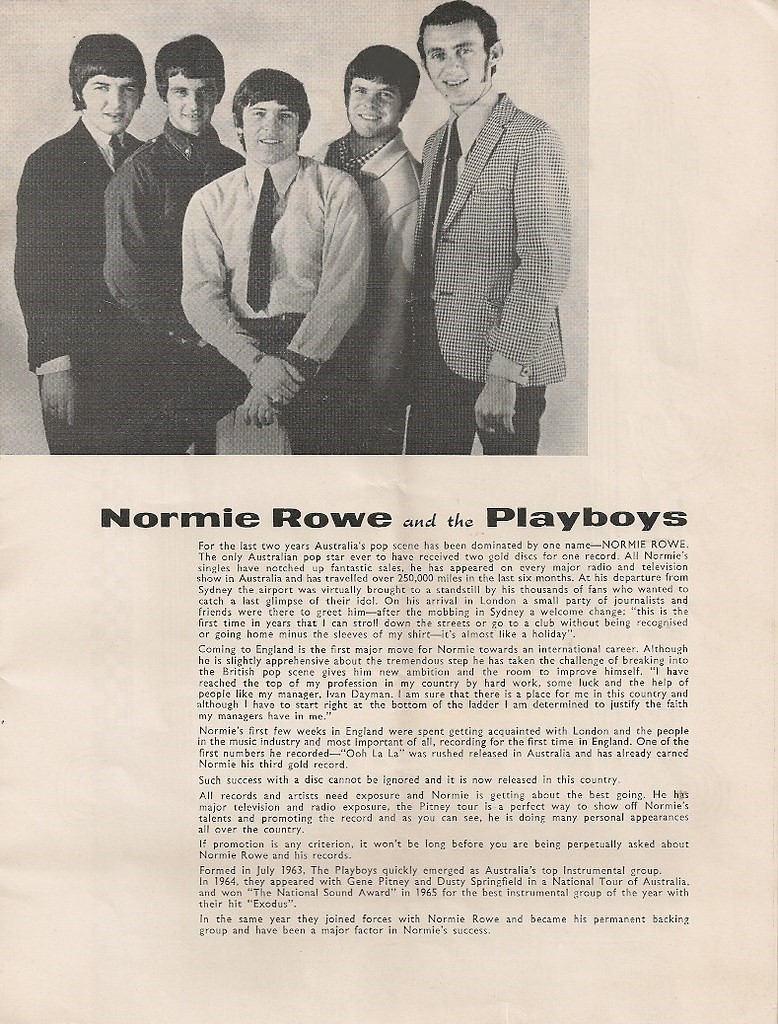
With less than two weeks to go, Normie Rowe & The Playboys were booked to take part in a major British package tour, opening for US singer Gene Pitney alongside The Troggs, The Loot and Sounds Incorporated.
As fate would have it, the group quickly recruited future Procession member Trevor Griffin (b. 22 December 1944, Birmingham, England), a gifted keyboard player and singer. Griffin had first come to prominence a year earlier with The John Bull Breed, a septet from Birmingham that had recorded a single “Can’t Chance a Break Up” c/w “I’m A Man” for Polydor Records in May 1966.
Best known for including future Moody Blues bass player/singer John Lodge and lead guitarist Tony Clarkin, who years later became a founding member of Magnum, The John Bull Breed changed name to The Question (Marks) soon afterwards but were pretty much on their last legs after Lodge departed for The Moodies in October.
“A Birmingham booking agent I believe named Arthur Smith informed me of an Australian band that were to play at the Belfry Country Club,” recalls Griffin. “I met Normie and Brian at the Belfry gig [on 6 February] and later went to London to rehearse for the Gene Pitney tour.”
The tour kicked off at Finsbury Park Astoria in north London on 17 February and saw English pop singer David Garrick added to the bill. It would prove to be a fortuitous move on the promoters’ behalf because Garrick’s backing group, The Vision, included singer and guitarist Mick Rogers (b. Michael Oldroyd, 20 September 1946, Dovercourt, Essex, England). Rogers would end up joining The Playboys only a few months later and would become the fourth and final member of Procession.
Rogers was already an accomplished guitarist. Born into a musical family, he had picked up guitar at an early age and worked with a number of groups during his teens, including his father’s dance band. During early 1965, Rogers and his latest band were playing at a holiday camp on the Essex coast when a family staying there suggested that they move to London where there were more opportunities to make a living from music.
The young guitarist took up the family’s offer to stay with them and, having moved up to London, joined his first major group, The Imp-Acts, featuring drummer Lloyd Courteney, bass player Bob Tuffin and rhythm guitarist/singer Howard Morgan. Signed to Pye Records in late 1965, the group recorded a lone single, “The Dum Dum Song” c/w “If I Were the One”.
The quartet also got the opportunity to record some unreleased material for Shel Talmy’s Planet label in February 1966. The two tracks – “It’s Superman” and “Our Love Is Gone” been since been issued on the Planet Beat CD.
Working with the Harold Davidson Agency, they then changed name to The Vision and, through Davidson, became Adam Faith’s new support band after The Roulettes had moved on to record under their own name. During their time with Adam Faith, The Vision also toured independently, largely playing US airforce bases, and also backed up Helen Shapiro before hooking up with David Garrick for the Pitney tour.
While the Pitney package tour progressed throughout March, Rod Stone decided that he had had enough and followed Phil Blackmore back to Australia.
“Rod was such a great musician and I always felt that we held him back somewhat,” explains Peacock on his friend’s departure. Back in Australia, Stone joined The Groove who would record a string of singles before relocating to England in early 1969 and issue a lone, rare single under the name, Eureka Stockade.
With a high-profile appearance lined up for Expo ‘67 in Montreal and with tours of the US and Australia in the pipeline, the group needed an urgent replacement and immediately turned to Mick Rogers, who had been alerted to the vacancy by Trevor Griffin. As Rogers points out, “It took me all of about 15 seconds to decide to join them.”
Joining The Playboys towards the end of March, Rogers was firmly in place when the group played at the California Ballroom in Dunstable on 8 April.
Before leaving the UK for Canada in late May, The Playboys managed to record a few tracks for Andrew Loog Oldham’s newly-formed label, Immediate.
“We never actually signed a contract with Immediate,” explains Peacock. “It was just a one-off thing and was really the seed that led to the formation of Procession.”
A single, credited to The (Australian) Playboys (funny considering only one band member came from Oz), coupled the band’s unique reading of the nursery rhyme “Bah, Bah, Black Sheep,” now re-christened “Black Sheep RIP”, with Peacock’s excellent original composition, “Sad”.
Unfortunately, the record buying public didn’t recognise its undoubted potential and “Black Sheep RIP” sank without a trace following its release in August. Original copies are now hopelessly rare, but that hasn’t stopped the single from becoming a huge collector’s item thanks to “Sad” being recognised as a minor classic of UK freakbeat.
With the recordings done, Normie Rowe & The Playboys readied themselves for their return to Australia via North America.
According to UK music magazine, Melody Maker, Normie Rowe and the band were scheduled to appear at Expo ‘67 in Montreal on 29 May as part of the Australia display.
However, this date is more likely to be the day the band arrived in Montreal, especially as Rogers remembers the group performing at a small rock venue in the city for a week before the show.
Iain McIntyre’s excellent book, Tomorrow is Today: Australia in the Psychedelic era 1966-1970 puts the Expo appearance down as 14 June, which is when Normie Rowe & The Playboys joined fellow countrymen, Rolf Harris and The Seekers as Australia’s representatives.
Two days after the Expo show, Normie Rowe and the band flew to the United States, where according to Melody Maker, they participated in a five-week tour with Roy Orbison, Sam The Sham & The Pharaohs and singer Keith.
Stopping over in Hawaii for a much-deserved break in mid-July, Normie Rowe & The Playboys arrived back in Sydney on 12 July to a hero’s welcome. As Mick Rogers recalls, a number of local musicians turned up, alongside the hundreds of fans, to ask him and Trevor Griffin about the latest trends in the UK.
Booked for 11 weeks, Normie Rowe & The Playboys began their homecoming tour across Australia to packed houses but then disaster struck. On 20 September, just as the band was arriving in Perth on the overnight train, Normie Rowe received his call up papers for National Service. The timing was particularly bad because Mick Rogers was celebrating his 21st birthday that same day!
With the singer’s departure set for January 1968, Normie Rowe & The Playboys began a farewell tour, which was cut short when the group announced that it would be quitting to become Procession.
According to Iain McIntrye’s book, The Playboys had planned to postpone the announcement until their Australian and New Zealand touring commitments were over, but changed their minds after a fight with Rowe at Melbourne’s Pinocchio’s disco on 25 October. The blow up may have been prompted by an announcement in the 25 October issue of Go-Set on page 3 notifying fans of the split.
As Brian Peacock explains, the idea behind Procession had been on the cards for some time.
“David Joseph, who had managed Normie’s UK stint, had come up with a revolutionary television format for a weekly four-hour pop music programme, which was designed to be broadcast on Saturday mornings.”
In essence, it was a cheap programming option to appeal to TV networks, which at that time had to provide a certain minimum quota of Australian content onscreen.
The show was called Uptight and Joseph envisaged that Procession would be the house band and provide backing tracks for performers that he recruited to mime covers of current hits.
“His idea was that we would use this as a vehicle to finance the creation of a new band aimed at the international marketplace,” continues Peacock.
“[This would] allow us to write and record the songs he was confident we would come up with to enable him to get us signed to a major American record label with the financial muscle to promote us world-wide.”
It was a brilliant idea and with Peacock, Rogers and Griffin all beginning to write strong material, it looked like a great game plan.
However, there was one last change before the “Procession” ball got rolling. With Rowe no longer in the picture, drummer Graham Trottman decided that he didn’t want to be involved in the new project and made way for Peacock’s former Librettos’ cohort Craig Collinge who broke up The Knack to join his friend.
Although Collinge didn’t contribute songs to the new project, he would get involved in the construction and feel of the songs and also added a fourth voice to the mix.
Within weeks of Collinge’s arrival in late October, Procession signed to Festival Records and cut their debut single, Peacock and Rogers’ “Anthem”, recorded a cappella with vocals from all four members, backed by Rogers and Griffin’s jazzy collaboration, “Take Time”.
The following month, Procession began their weekly segment on Uptight, which attracted favourable reviews, particularly in Go-Set magazine.
Writer Lily Brett introduced fans to the group in the magazine’s 15 November issue under the banner, “Everyone’s Joining The Procession”, in which she noted, “With everyone uttering such complaints as: the scene is dead, there’s no money, no work, I feel The Procession is the bright spark that will light the Australian pop scene again.”
Lily Brett’s favourable review of the group enabled her to get an exclusive sneak listen to “Anthem” two weeks before its official release. The writer was clearly impressed by its innovative sound and gave the single a positive write up on Go-Set’s record review page in 13 December issue, claiming, “[It] will astonish and could revolutionise the pop world”.
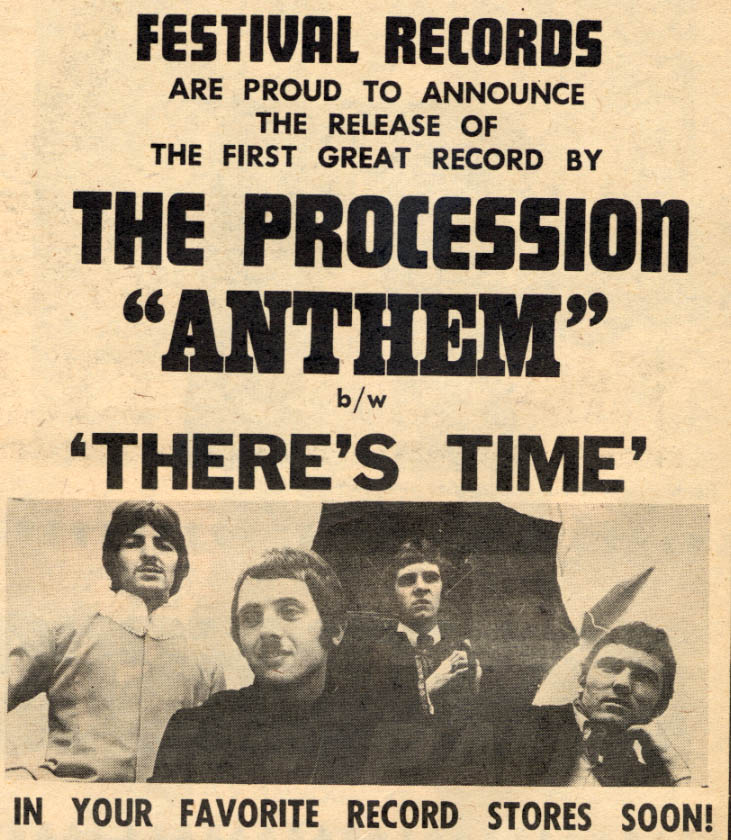
In a special feature on the group in the same issue, Lily Brett went further exclaiming, “You must prepare yourself appropriately, before you are ready for THE PROCESSION! Clear your mind of all the little thoughts and interruptions – and listen intently to ANTHEM. A new sound, unique untried before in the whole of the pop world. Intricate, involved, ingeniously devised.”
As the writer rightly points out in the feature, the single was recorded without any musical instruments: “The backing track is all vocal; all the intricate sounds usually provided by bass, rhythm and lead guitars, organ and drums, are mimicked by the voices of The Procession; with a sad, almost cynical, message sung through and over the involved backing.”
It was certainly a bold move by the group, which had kicked off its career with an innovative sound never attempted before. The band’s performance of the song on Uptight backed by a 40-piece choir made an instant impression and was enough to encourage Tony Knight, owner of the Victoria and Albert and Sebastian’s discos in Melbourne to book the group for 22 nights in his clubs, Sebastians and Berties. When the norm was for club owners to book Australian bands for one night at a time, Procession had once again been the first to break the mould.
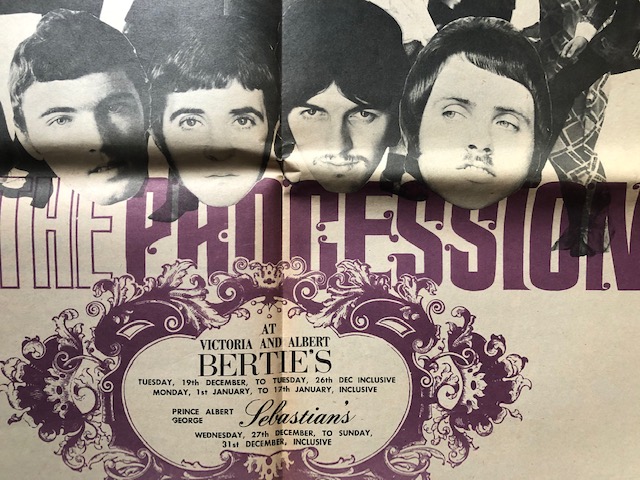
On 17 December, the same day Australian Prime Minister Harold Holt went missing while swimming off the Victoria coast, Procession made their public debut at Sebastians in front of 1,300 fans. This was followed by further shows at Berties from 19-26 December before the band returned to Sebastians to perform from 27-31 December.
After playing further dates at Berties from 1-17 January, Procession gigged incessantly throughout the early months of 1968. On 20 January 1968, “Anthem” peaked on the Australian national charts at #30.
In Melbourne, the group became a popular live draw regularly playing five-six nights a week, often with multiple gigs a night.
“I recall a mini riot at an outdoor gig in Melbourne,” says Griffin. “I believe a beer can came on stage from the audience. I threw it back and all hell broke loose – cans were flying everywhere.”
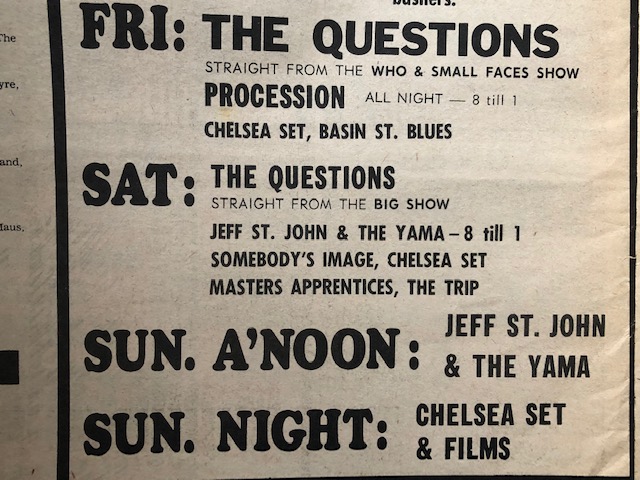
Procession played at Sebastians on 8 and 10 February, with a show at the Catcher on the intervening evening.
Throughout this period, the group’s songs continued to evolve and in some cases, such as “Anthem” and “Take Time”, the band even reworked the tunes.
“There were a lot of jazz influences in the way we kept finding undiscovered nuances in these songs,” explains Peacock. “It made for exciting live performances and some versions worked better than others but we never avoided a challenge.”
During March 1968, Festival Records released Procession’s second single, the Peacock-Rogers collaborations, “Listen” backed by “Minuet for Moderns”. The first Australian record to be recorded on eight-track, it was another highly ambitious affair.
“Procession was known to be quite an outrageous musical band,” explains Rogers. “We took risks. We were experimenting all the time.”
Looking back on the session in question, Rogers remembers recording “Listen” in about six hours. “We would do crazy sessions,” he notes reflecting on the busy schedule the group had in those early days. “We used to do three backing tracks in a day. It was [also] the in-thing to record in the night. We’d get in the studio at night and record to eight in the morning.”
Notable for its whispers and subtly atmospheric backing instruments, “Listen”, has a slight Small Faces feel about it and would not have been out of place on Ogdens’ Nut Gone Flake.
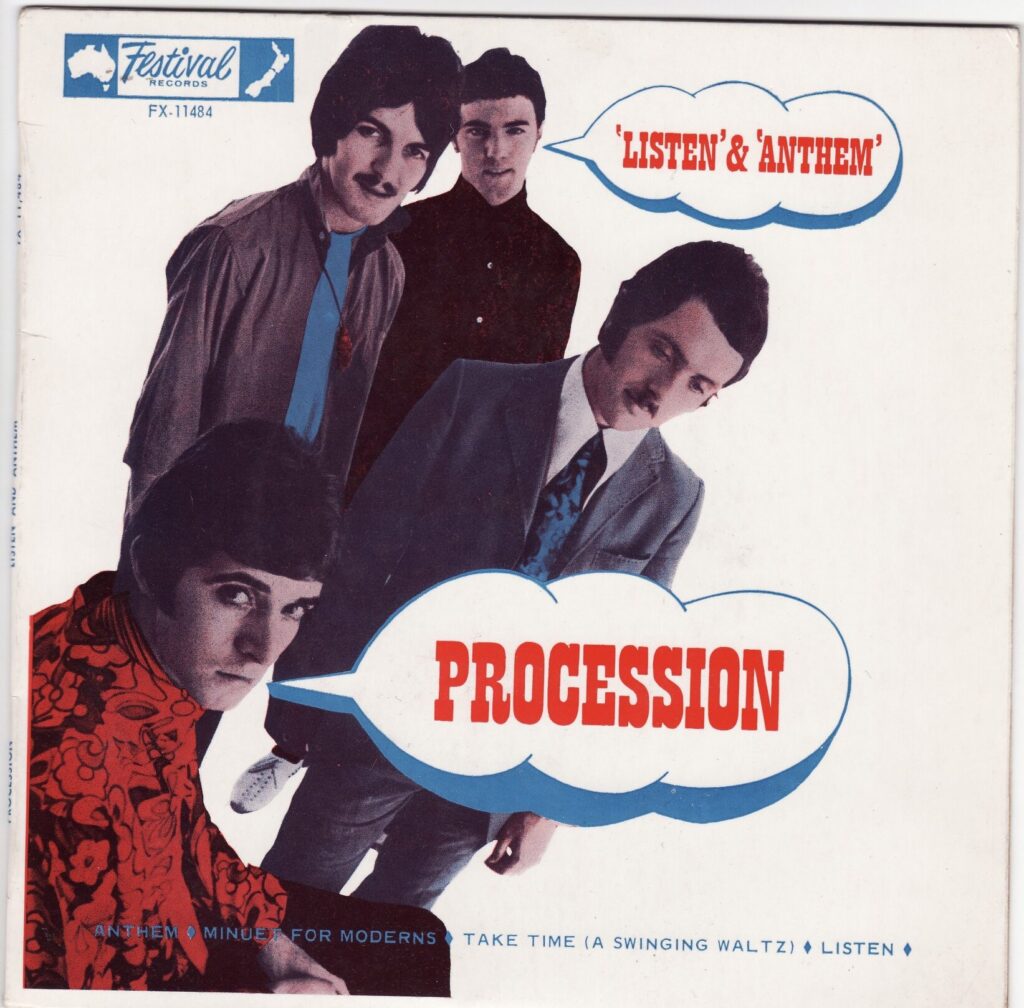
The single’s jazzy B-side meanwhile offers an interesting contrast and allows all four members to show off their unique vocal interplay. Like its predecessor, however, the record was probably too highbrow for the record buying public and stalled at #55 on the national charts on 30 March.
Despite the failure of both singles, all four tracks surfaced on the group’s debut album, Procession Live at Sebastians, released on 15 May. As its title makes clear, the entire set was captured during one of the band’s shows at the club and set the standard for others to follow by being the first stereo live album to be recorded by an Australian act.
It’s an interesting record that mixes original material with covers such as The Beatles’ “With a Little Help from My Friends” and the jazz standard “Nobody Knows You When you’re Down and Out”. Incidentally, one of the original songs, Peacock’s sumptuous ballad “Penelope” was also recorded by Normie Rowe and reached the Melbourne top 20 in March of that year.
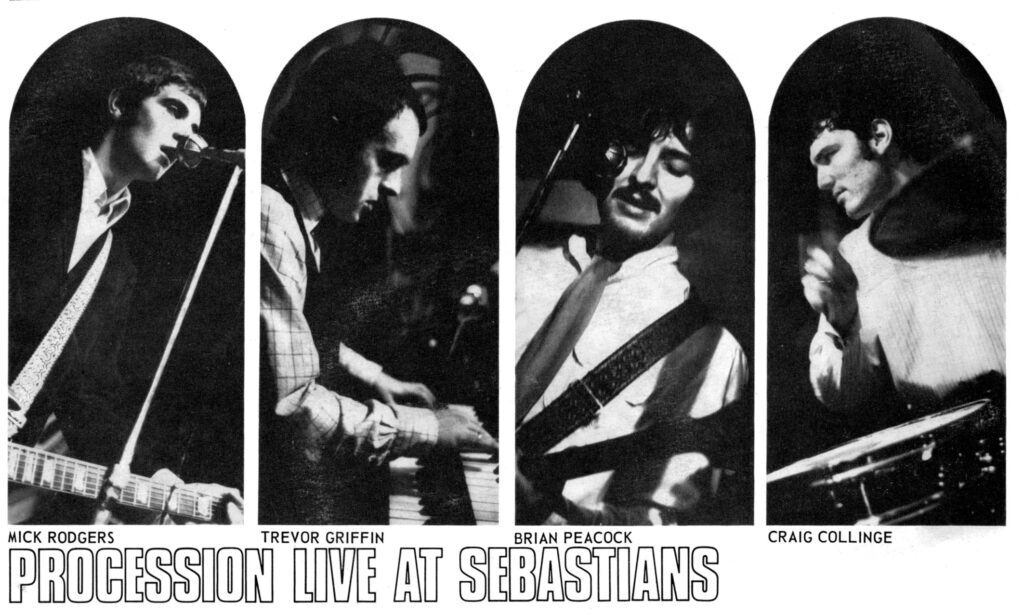
“The live recording was set up on the Sunday,” remembers Collinge. “[We set up] the recording equipment, ran though [the songs] and went for it on the Monday night to a packed crowd. In the mix down we edited ‘Sitting in The Park” from 15-minutes to 8-10 minutes and we added a few vocal and guitar touches.”
While most of the material would be abandoned when the group moved to the UK later in the year, a couple of tracks were later revived, albeit with different arrangements for the second (studio) album. These included the aforementioned “Take Time” and Griffin and Rogers’ jazzy “Signature Tune”.
“These songs had worked well in the live shows and we wanted to give them better production values in the studio with a good producer following the debut live album,” explains Peacock.
For some inexplicable reason, the record label decided not to include arguably one of the band’s most powerful songs on the album.
Named after a Melbourne locality, Peacock’s “Sebastapol Street” is a stunning track that deserved a much greater profile. Perhaps the band’s rarest outing, it is almost impossible to find. In Iain McIntyre’s noteworthy book, he assigns a catalogue number, which suggests that the track appeared as a single, although this surely must have been as a limited pressing if it was indeed the case.
McIntyre’s book includes the following review of the track: “From the opening ‘See My Lane’ chant, to the clattering freakout at the end, ‘Sebastapol Street’ is the musical equivalent of a locomotive hurtling at full-pelt through the countryside. Trevor Griffin’s Hammond organ work is white-hot, Craig Collinge’s drums are simply out of control, and guitarist Mick Rogers plays some searing lead guitar towards the close.”
“[Sebastapol Street] happens to be one of my favourite un-released Procession songs as it only exists in demo form,” confirms Peacock.
“I wrote it in 1968 when I was living in that street in St Kilda during the first few months of the band’s existence; it was the period when we were doing the Uptight TV show every week; doing five to six gigs per week and spending days on end in Armstrong’s studio in Albert Park pre-recording the current hits of the day for various ’singers’ to mime to on the TV show. Whenever we could we would demo some of our songs and that was one of them.”
After a gig at Berties on 28 April, Procession embarked on a nationwide tour, journeying first to Sydney and then west to South Australia and Adelaide where the band established a large local following.
During May manager David Joseph flew to England to stoke up interest in the band and to negotiate a worldwide record deal. On 5 June, he got what he was after, signing Procession with Mercury/Philips in the UK and Smash in the US. He then flew back to Australia to prepare the band for an assault on the UK market.
“David was a visionary,” explains Peacock. “We had a heavyweight British booking agent Harold Davidson personally looking after us. We all packed up our families and moved to England and all lived in a luxury house just behind Buckingham Palace [in Chester Square], which was rented from Lord Russell, the British High Commissioner to Brazil.”
Procession played at the Go-Set ball held at the Royale Ballroom on 18 June with The Twilights, The Party Machine and The Virgil Brothers and then performed their final Australian show the following night at Berties before heading to England in July.
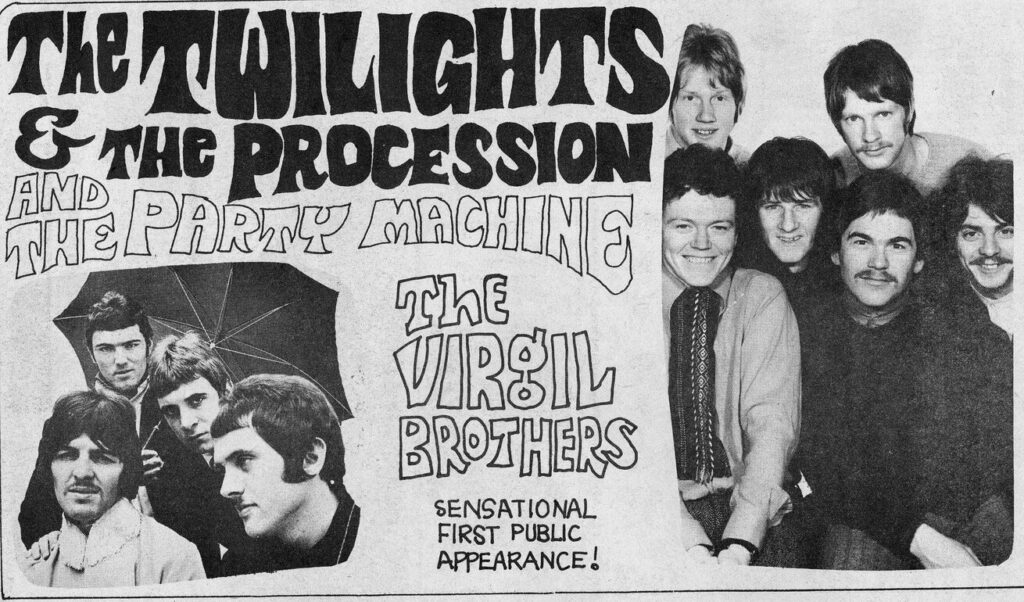
Arriving in London, they immediately set to work writing fresh material for the band’s second album. Peacock in particular was incredibly prolific writing poppy gems like “You-Me”, the atmospheric “Gently Does It” and the majestic ballad, “Adelaide, Adelaide”. He also began to collaborate with Trevor Griffin on more jazz-flavoured rock numbers like “Mind Magician” and “Sweet Simplicity”.
During the first few months in London, the band did not play any gigs, concentrating instead on readying material for the forthcoming album sessions. For Collinge, who had no direct input into the song writing, sitting around not playing for a long period was deeply frustrating.
Procession first worked with drummer-turned-producer Phil Wainman, who’d recently worked with the original Sweet on their debut single “Slow Motion” but the sessions didn’t go well.
In September, Philips approached Manfred Mann drummer Mike Hugg to ask him to oversee the sessions that month. Dropping by a rehearsal, he liked what he heard and agreed to take on the project under executive producer, Lew Reisner.
Hugg’s influence can probably be best heard on “Every American Citizen”, the band’s debut UK single, which has a sound not that dissimilar to Manfred Mann’s records during the late 1960s (and incidentally is co-produced by former member Mike Vickers).
As the recordings drew to a close, Procession made their debut public appearance on Dutch TV (remember Philips was a Dutch-owned company).
In mid-September, the group also started to pick up national press coverage in Britain, including in the Birmingham Evening Mail on 18 September, which contained an interview with local boy Trevor Griffin under the title ‘No place in the world like Brum’.
On the week ending 21 September, the band’s forthcoming debut UK single, “Every American Citizen” was splashed on the front cover of New Musical Express, signalling the band’s arrival in Britain.
Released on 20 September, the single was reviewed by Record Mirror the following day.
“This has instant impact, as they say,” noted Peter Jones on the magazine’s singles review page. “The process is to build a clever vocal line around a catchy chorus – and fill in with commentary-type verses about the way of life in the States. They procede [sic] to a falsetto-filled finale. It’s often difficult for a new group to get sufficient exposure to click – but I do hear tell there’s a lot happening for these boys. A fine debut.”
Record Mirror’s Ian Middleton wrote an accompanying piece in the same issue to introduce the band, together with a photo, under the headline “Join The Procession”.
“At times a plethora of pop groups hit the scene – literally a procession of them,” he noted. “But every now and then, one stands out. On this occasion boys and girls, it is the Procession.”
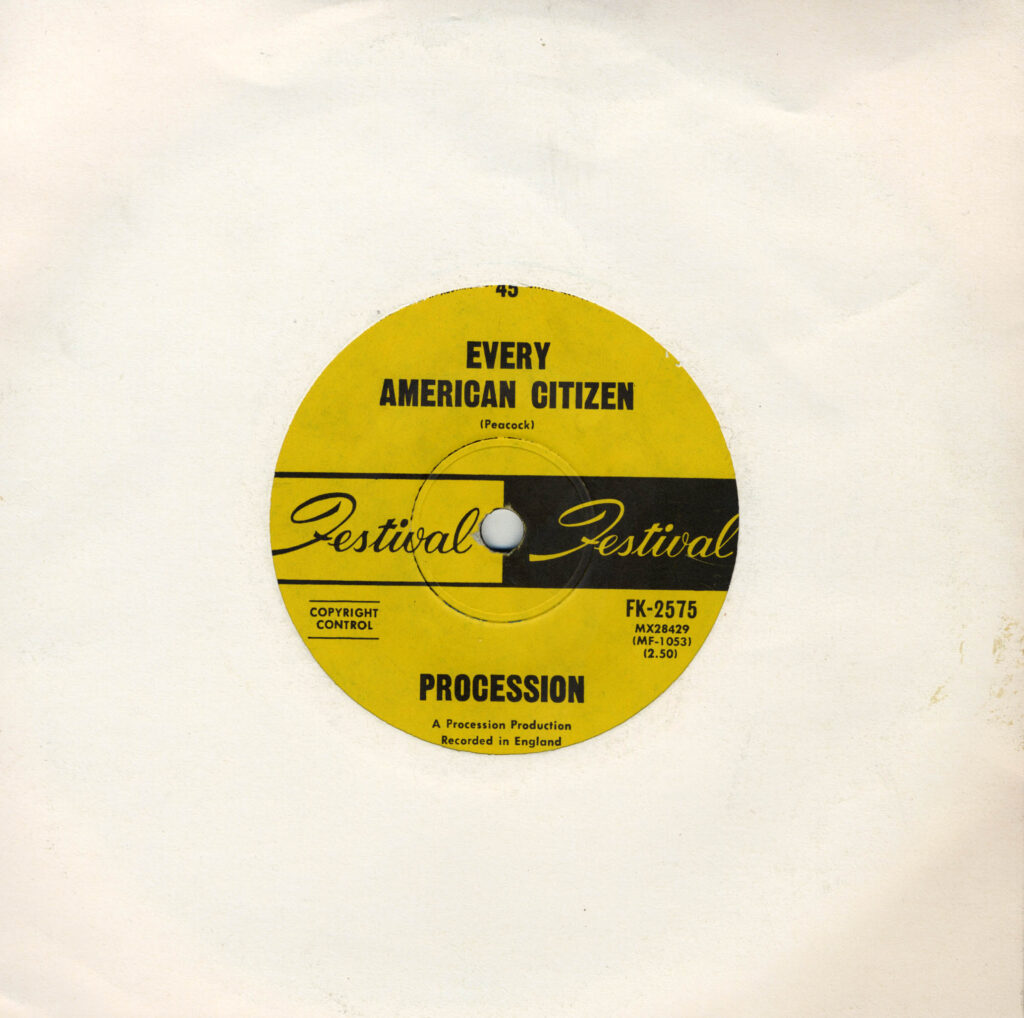
The single was also reviewed in New Musical Express in the week ending 28 September.
“[’Every American Citizen’] has interesting lyrics and some nice touches and the group shows a lot of promise which bodes well for the future though I don’t think this single has sufficient impact to get them away this time,” noted the magazine’s reviewer Nick Logan in a column that also saw Cream’s “Sunshine of Your Love” and Joe Cocker’s “With a Little Help from My Friends” reviewed.
Sure enough, with its catchy melody, strong production and an excellent lead vocal from Mick Rogers, the single had all of the ingredients of a hit record but was overlooked by the record buying public and failed to chart. Released in Australia, it was a minor hit, peaking at #82 on the national charts.
The following month the band made one of its first UK appearances on Southern TV’s Time for Blackburn show screened on 11 October. Later that month, the teen magazine, Valentine introduced the four musicians with a small picture in its 26 October issue.
In November, Procession took part in a tour of northern England and Scotland, which also featured at various times Dave Dee, Dozy, Beaky, Mick and Tich, The Herd, Jimmy James & The Vagabonds and The Love Affair among others.
Putting aside “Every American Citizen’s” chart failure, the band decided to follow their UK debut with a heavy rock version of “Anthem”, which was renamed, “One Day in Every Week” and featured an accompaniment by Mike Vickers. Once again, Rogers delivers a faultless lead vocal while the others chip in with some excellent harmonies.
The single’s UK pressing, incidentally, includes Peacock’s “Wigwam City” on the flip.
“I think I actually wrote the main part prior to living at Colley Corner [in Reigate, Surrey],” remembers Peacock. “It was more a groove on a percussive use of lyrics that we liked at the time. I would have to plead guilty if anyone accused me of overdoing alliteration during that period.”
Released in the lead up to Christmas, “One Day in Every Week” should have been the breakthrough that the band deserved but yet again the single failed to chart.
While the band was clearly disappointed, things were starting to pick up in terms of bookings.
With their debut UK album only weeks away, Procession played their first show at the famous Marquee club in Wardour Street opening for Yes on Wednesday, 15 January. According to Tony Bacon’s excellent book, London Live, Procession would become regulars at the esteemed club and appeared no less than 15 times throughout 1969.
Over the next few months, beginning with a headlining show on 8 February supported by Spice, Procession played the Saturday night slot, joined (according to Bacon’s book) by an array of intriguing acts including Octopus, Pegasus, Kippington Lodge and Audience.
“The Marquee was a good learning curve,” says Rogers looking back at the band’s residency.
Apart from the Marquee, Procession were also billed to play notable venues such as Blaises, the Whisky A Go Go, the Speakeasy and the Revolution clubs.
Rogers remembers one notable occasion at the latter where he sang a cover of Traffic’s “40,000 Headmen”. “I looked down in the audience and there was Stevie Winwood,” he laughs.
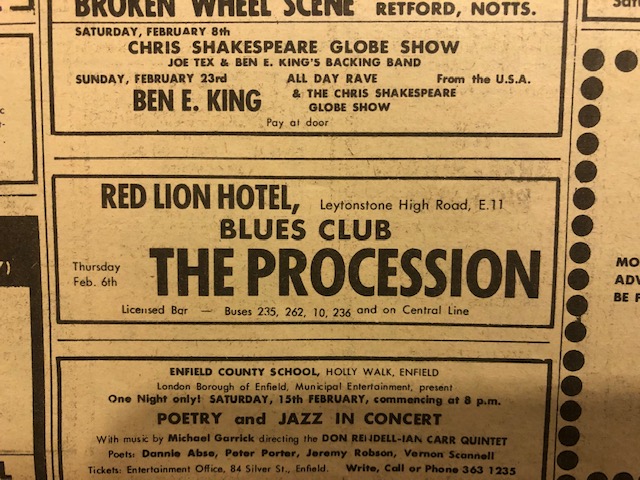
Like hundreds of other bands working the live scene in the London area, Procession also played their fair share of tiny pubs and clubs in provincial towns and suburbs, such as the Red Lion Hotel Blues Club in Leytonstone, east London.
By this point, the group had a new residency in the heart of the Surrey countryside – a huge old mansion called “Colley Corner” in Reigate.
Released in the UK in February 1969, Procession was greeted with mixed reviews.
New Musical Express’ Allen Evans, who reviewed the album in the issue in the week ending 15 February, gave a largely positive spin.
“They don’t put a foot wrong,” he noted. “They came from Australia leaving a sizeable reputation behind them. I liked their tongue twisting ‘Essentially Susan’ and the wistful ‘You-Me’.”
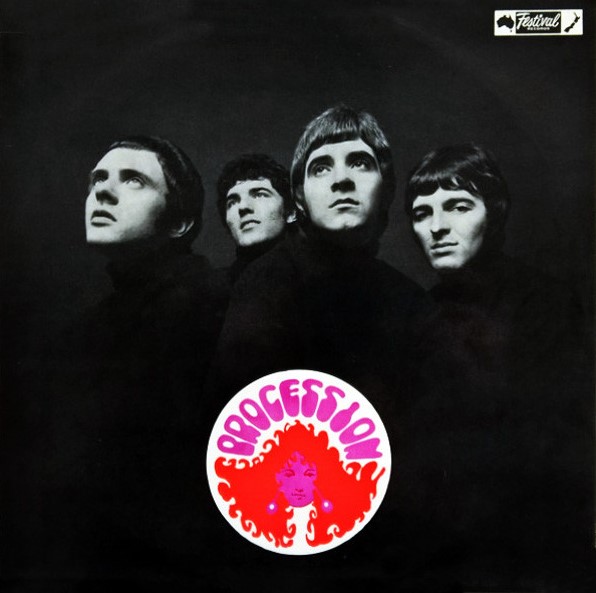
Melody Maker, on the other hand, was particularly scathing in its 8 March issue, noting: “The Mercury label seem to have a talent for spotting the mediocre and the dull and instantly purveying it to the public via expensively produced albums.”
That’s deeply unfair because the album contains some brilliant moments and most of the songs stand up extremely well by today’s standards.
Even so, Mick Rogers expressed his frustration with the way the record company dealt with the band. He believes that had Philips left the musicians to their own devices, they could have been a success at the time.
“I could never understand how a record company signs you for what you’re good at and then changes you,” he explains. “It got tougher when we came to England because people tried to change us.”
Trevor Griffin agrees: “The ‘live’ album was much more who we were than this other album that we put out in England. The English album was an attempt to be a kind of pop group whereas Procession live was more true to what we were. We were into solos and experimenting on stage a lot and seeing where things went. Every night was different.”
Interestingly, the UK pressing of the album differs slightly in its track listing from the American and Australian versions (and probably other foreign releases). To start with, the British pressing uses “One Day in Every Week”, whereas the other two opt for “Anthem”, although this is not the a cappella version that was originally released in Australia as the band’s debut single but a third version with instrumentation.
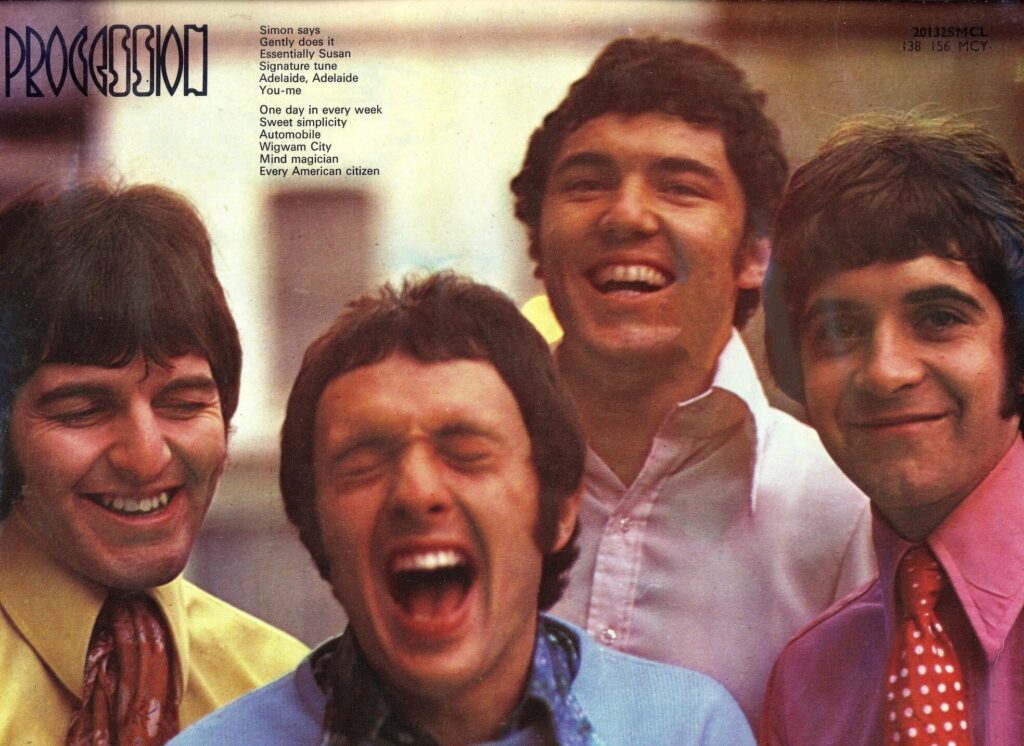
The British pressing also eschews “Take Time”, the B-side of “Anthem”, and replaces it with the aforementioned “Wigwam City”. Most controversial, however, is the decision to ditch Peacock and Griffin’s “September In July” in favour of a cover of the dreadful “Simon Says”, which attracted particular wrath from UK critics. For avid record collectors, the UK, US and Australian covers all differ completely, making them all a collector’s item.
“Lew Reisner produced the second album and really had little idea of the Procession concept so session musicians were brought in and it was a disappointing affair,” points out Collinge, who bowed out shortly afterwards.
The negative press and the lack of sales must have hurt and it’s no coincidence that sometime during the first few weeks of March, the drummer moved out of the Reigate house to stay with Manfred Mann in Lea Green.
Together with Mike Hugg, they formed the short-lived Emanon (no name backwards), which subsequently changed name to Manfred Mann Chapter Three and recorded two albums for Vertigo Records.
Collinge left during the recording of the second album and joined former Animals member, Alan Price, touring the UK and France before joining the punk rock band, Third World War and then Shoot.
After a brief stint with the bogus Fleetwood Mac among others, Collinge returned to Australia in 1975 and went on to play with The BBI Experience on Sydney’s northern beaches. He even recorded a solo CD, Fury, in 2012.
In his place, the group recruited seasoned drummer Chris Hunt (b. 14 November 1945, Hillingdon, Middlesex), who had played and recorded with a number of interesting artists, including The Good Time Losers, Cat Stevens and Whistling Jack Smith since arriving in London from the south coast in 1966.
Just prior to joining Procession, Hunt played drums with future Mott The Hoople singer Ian Hunter in the short-lived Pendulum and remembers hearing about the band opening through Pendulum’s roadie.
“Pendulum was splitting up, Ian was leaving and I was looking for a gig,” he explains. “I think Richie knew some of the guys in Procession. I went down for an audition and got the job.”
Shortly after Hunt’s arrival, Procession returned for a second Saturday night show headlining at the Marquee on 22 March, supported once again by Spice. However, as Mick Rogers points out Procession had lost some of their momentum and fresh blood was needed.
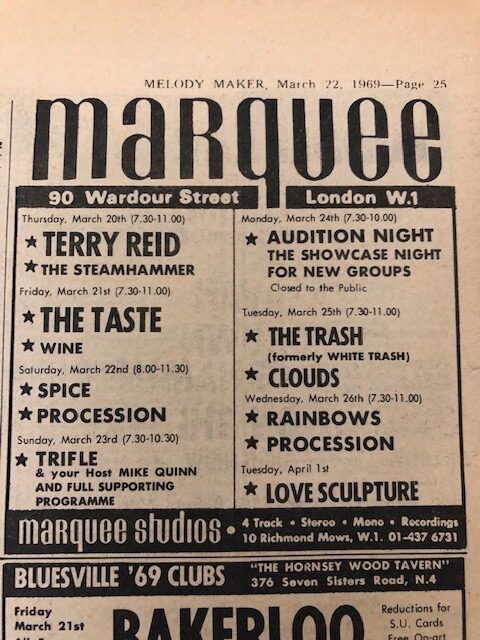
Peacock knew just the right person and immediately called Melbourne to ask Ross Wilson (b. 18 November 1947, Armadale, Victoria), lead singer with local band, The Party Machine, to fly to England.
As the Australian singer recalls, he was already familiar with the original line up from gigging on the Melbourne live circuit.
“I received a phone call from Brian Peacock in the UK,” remembers Wilson. “They were having a line-up change and felt a front man might be a good idea. I had to pay my own way there, but had just scored an insurance payoff from a traffic injury and was eager to escape Melbourne and see the world.”
“I loved his progressive ideas and song-writing and he had a strong sense of theatre and a great pop music sensibility,” explains Peacock on his decision to recruit Wilson rather than hire someone from the London scene.
On 2 April, Ross Wilson abandoned his group and flew to London to join the rest of the Procession members.
While Peacock had envisaged Wilson’s joining as a positive move, others were less enamoured of the new lead singer and the change in the group’s internal dynamic.
“That was the end of the band when he joined,” feels Hunt. “I thought Mick was fantastic. His voice was great and then suddenly he was pushed aside. I didn’t think [Wilson] was anywhere as good as Mick and Mick should have really stuck up for himself and said, ‘I’m the singer’.”
Rogers was also less than happy about the decision. “It was all about Ross. He couldn’t care about Procession. He was more of a mate of Brian’s. I think he used Procession to get into England.”
Despite these reservations, Procession still had some mileage. On 5 April, only days after Wilson’s arrival, the band was back at the Marquee for a Saturday night show headlining over The Shoo String Band.
The group returned the following weekend for a show with Octopus and then resumed its regular shows around the capital, including performances at Edmonton Cooks Ferry Inn in north London on 28 April (and 26 May) and Dreamland Ballroom, Margate with Marmalade on 3 May.
Procession returned for their Saturday night residency at the Marquee, headlining over Mandrake Paddlesteamer on 10 May. Over the next three weekends, the group was joined by Pegasus, The Maddening Crowd and finally The Eyes of Blue on 31 May. “Saturday night was more tourist night than others so crowds varied,” remembers Wilson.
During this period, the group got the opportunity to record some new material at Olympic Studios in Barnes. Three tracks were cut at the sessions – Mick Rogers’ “Surrey” and Wilson’s “Papa’s In The Vice Squad” and “I Wanna Be Loved”, all of which were consigned to the vaults and have yet to see the light of day.
On Saturday 7 June, Procession returned to the Marquee for a show with Kippington Lodge, returning the following weekend when Audience provided support. Both groups were also billed for the next Monday night, 16 June.
By this point, the band’s music had evolved into something quite new with Ross Wilson adding a more theatrical feel thanks to his interest in Frank Zappa’s Mothers of Invention.
One of the new songs incorporated into the set, but never recorded by the band, according to its author, was “Make Your Stash”.
“[It] was later recorded by both Spectrum and Daddy Cool and the source for inspiration for Manfred Mann’s Earth Band album that used Holst’s ‘Planets Suite’,” claims Wilson. ‘Make Your Stash’ used one of the themes from that suite with my lyrics and bridge which Mick appropriated for Manfred Mann using new lyrics.”
On Saturday night, 21 June, Procession played their penultimate show at the Marquee with the band Joint and then returned for the last Saturday of the month for its final appearance alongside Octopus.
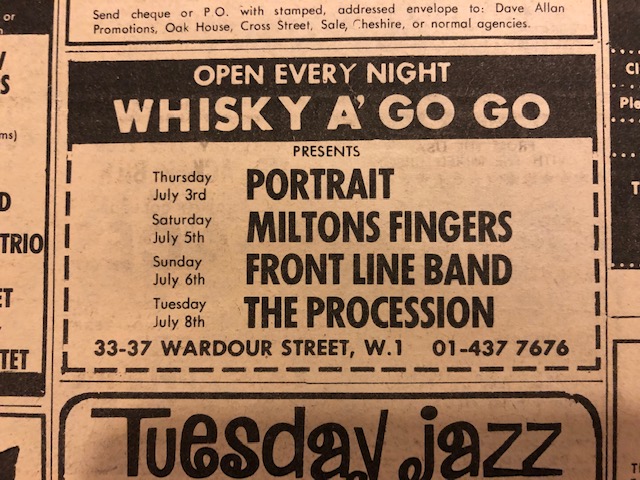
However, the group continued to land gigs in London West End clubs, including the Whisky A Go Go on 8 July and the Speakeasy on 30 July.
With the group on its last legs, David Joseph secured a rather odd booking for the band – a transatlantic student cruise from London to New York and back, which was set for the second week in August 1969.
“It was the best thing we did,” opines Wilson. “[It was] a lot of fun and we got to play every night and join in some cool arty student performance stuff during the day.”
The ship in question was the Greek cruise ship, Aurelia, which was making its final trip.
“It was a real old rust bucket, taking all of these students back to New York,” remembers Hunt. “It took nine days, that’s how old the boat was and there were no stabilisers.”
Griffin, recalling one occasion when the boat struggled through the tail end of a hurricane, remembers the boat as a “floating den of iniquity”.
“The entertainment area was the aft end of the boat. Every time the rear end went up, my Hammond organ went out of tune due to lack of electricity and the feeling I’ve fallen off the end of the boat. Playing was a laugh a minute, chundering everywhere!”
As the band’s drummer explains, the trip was supposed to help pay off the band’s outstanding debts and he remembers being paid only a dollar a day for the entire trip. Hunt adds that the group returned from New York just days after Woodstock wrapped up.
To all intents and purposes, however, the group was over. “We all got back home and said, ‘That’s it, no more’,” remembers Rogers, who was ready to move on and explore new musical avenues.
“[We] ran out of money and industry interest,” adds Wilson. “By then manager, David Joseph was more interested in the New Seekers, plus I think the new line up [with me and Chris] had meant the group lost whatever focus it had.”
With Joseph planning his next move, Procession’s members went their separate ways.
Chris Hunt subsequently recorded an unreleased album with the short-lived Paradise Hammer before touring with Thunderclap Newman and recording with Mojo Hannah. Throughout the 1970s, he worked with a multitude of artists, including Meal Ticket, Leo Sayer and Dana Gillespie. Since then, he has toured and recorded with Lonnie Donegan and Van Morrison. He later worked with The Bruvvers and Tom Nolan’s Bluescasters.
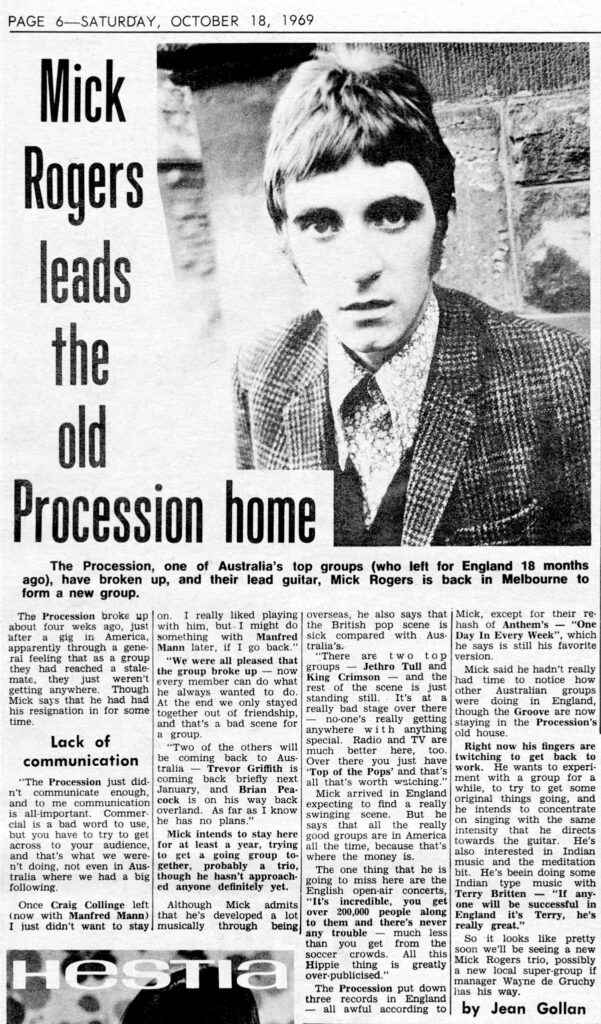
Mick Rogers headed back to Australia in October and spoke to Go-Set’s Jean Gollan about the band’s break up in the magazine’s 18 October issue.
“The Procession just didn’t communicate enough, and to me communication is all-important,” he said.
“Commercial is a bad word to use, but you have to try and get across to your audience, and that’s what we weren’t doing, not even in Australia where we had a big following.”
In November, Rogers joined Doug Parkinson In Focus, appearing with the group at the Pilgrimage for Pop held at Ourimbah in New South Wales on the weekend of 24-25 January 1970. The following month, he moved on to form Bulldog with another ex-pat Englishman, former Purple Hearts and Coloured Balls bass player Rob Dames and ex-Bay City Union drummer Peter Miles.
The band recorded a one-off single, “Man of Constant Sorrow” before falling apart. In late 1970, Rogers took up Manfred Mann’s offer to join his Earth Band and stayed with the group until 1975.
After various projects, including Aviator, he re-joined The Earth Band. He continues to work with them to this day while also finding time to release solo LPs.
Trevor Griffin also returned to Australia and worked first with Normie Rowe and then Ross Wilson in the Sons of the Vegetal Mother before returning home around 1971/1972.
“I sort of hung up my boots,” recalls Griffin on his decision to quit performing. “Brian was working with the New Seekers. He went back to Australia and I took over and became their roadie and sound engineer.”
Through the sound and lighting company Entec, Griffin then started working with the glam rock group, Sweet and ended up co-penning the UK and US top ten hit single, “Love Is Like Oxygen”.
Griffin worked with the group for ten years before moving to Memphis, Tennessee in 1991 where he currently lives.
“I was a sound engineer for a lot of bands and I was always on tour,” says Griffin. “Sweet used to do a lot of tours over there. Then I did other tours. I did a Black Sabbath tour and I used to be Joan Armatrading’s sound engineer. I was on her first two tours.”
After Sons of the Vegetal Mothers, Ross Wilson fronted the popular Australian acts Daddy Cool and Mondo Rock. The former scored a nationwide Australian chart topper with “Eagle Rock”. Wilson later penned John Farnham’s hit “Touch of Paradise”. He then launched a solo career, releasing a string of LPs.
Procession founder, Brian Peacock took his family to Morocco for three months to qualify for UK immigration regulations, which enabled him to get a new work visa.
After returning to London in 1970, he worked as a songwriter for a year and had his songs recorded by a number of artists including Kiki Dee among others. He also collaborated with former Virgil Brothers’ member Rob Lovett on the songs “It’s A Beautiful Day”, “Shine People Shine” and “When There’s No Love Left”, which were recorded by The New Seekers. During this time, he recorded an LP with Terry Britten under the name Homer, released in 1971.
Peacock also became The New Seekers tour manager and worked with the group until 1972 when he returned to Melbourne.
Back down under, he started Australia’s first organic vegetarian wood-fired wholefood bakery and wholefood store called Feedwell Foundry, but later moved back into the music business. After playing and recording with country-rock band Western Flyer in the late 1970s, he went into rock management before becoming managing director of Export Music Australia in the early 1990s.
On reflection, there is a final twist in the Procession story. After all the band’s chart failures, David Joseph’s New Seekers made the UK Top 20 in 1978 with their version of “Anthem (One Day in Every Week)”.
It must have made Peacock and Rogers smile, although, as far as this writer is concerned, it doesn’t come close to matching Procession’s brilliant original.
Many thanks to Brian Peacock, Mick Rogers, Craig Collinge, Trevor Griffin, Chris Hunt, Ross Wilson, Ben Whitten, Barry McKay, David Kent, Mike Paxman.
Copyright © Nick Warburton. All Rights Reserved. No part of this article may be reproduced or transmitted in any from or by any means, without prior permission from the author.
The original version of this article was published on the Nick Warburton website on 20 March 2008. This is an updated version.
